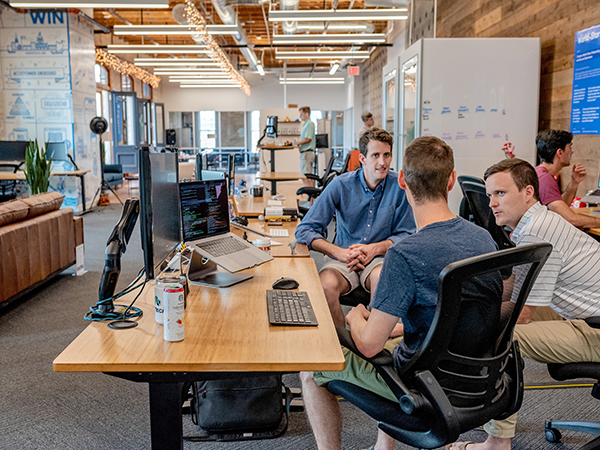Learn From Failures with Lane Kawaoka
The age-old advice of learning from the people who have the experience remains true to this day. When it comes to investing, nothing beats the wisdom of those who have walked through the fire and experienced failures along their journey. Host of the Simple Passive Cash Flow podcast, Lane Kawaoka gives great wisdom as he shares some of the failures he's had along the way of being a real estate investor by night and a professional engineer by day since 2009. Lane has experienced passively investing in multifamily syndications, mobile home parks, private money lending, and turnkey rentals. He lays down some insights about partnerships, operators, and more.
---
Learn From Failures with Lane Kawaoka
Our guest is Lane Kawaoka. Lane started out as a professional engineer with a Master’s degree in Civil Engineering. He owns twelve single-family houses. He controls two mobile home parks and over 1,600 units in the Midwest and through the Southeast US. We’re going to talk about some important details around passive investing and some of his experience in passive investing back when he was a passive investor. Lane is the guy to talk to about this stuff because he’s the host of the Simple Passive Cashflow podcast. I’m very excited to talk to him. Lane, welcome to the show.
Thanks for having me, Taylor.
I noticed some of your experience back when you were in the LP waters, now you’re general partnering. You’re syndicating deals. Back when you were a money partner in deals, there were a couple of things noted as failed LP syndications and failed syndications. What happened there? What can we learn from that experience?
That was when I was first getting started in the LP stuff. At that point, I had five or six single-family homes by myself. I had some money in my Self-Directed Roth IRA. You realize how it’s not that great, all that Self-Directed IRA and Solo 401(k) stuff. You can’t leverage it. You can’t get Fannie Mae or Freddie Mac loans. I was looking for something to do with that money other than keeping it in some mutual fund account. I asked the Self-Directed IRA custodian, which was mistake number one. What do these guys know? They’re just custodians. They’re not investors. I said, “What do you keep investing on stuff?” They connected me with an operator who had this deal where you go on title to a property with them. They manage a turnkey. They give you a 9% pref and 50/50 at the backend. I was like, “Let’s do this.” It was $40,000, $45,000 for it. It’s a pretty substantial buy-in but I didn’t know them. I understood the whole buying of single-family homes. I bought on to that area, the local submarket. I believed in that. In hindsight, there were a lot of things I should have done.
On paper, that sounds great, a 9% pref and a 50/50 split on the backend. This was a few years ago. What timeframes did this happen?
It’s maybe 2013 to 2015.
If you were faced with this same situation now, what would you do differently?
That’s the hard part about these passive deals. A lot of times, it’s like kicking the can down the road. There are a lot of deals where people are using crazy assumptions where they’re thinking the cap rates are going to go lower. Unfortunately, you don’t see how much they misled people until three, four or five years in the future. That was like what I was. In this sense, it was more of the fact that the operator turned out to be a scamster. When I look at deals these days, half of it is the numbers. The other half is the people. Do they act with integrity? What’s their track record? Did I know them firsthand? In this case, it was a loose referral. Nowadays, I don’t invest with anybody I don’t know, like or trust. It’s one degree of separation and no other people in their deal, other passive investors. That’s why I tell a lot of people, “Don’t spend your time talking to syndicators. Spend your time talking to other limited partners and building good relationships with them.” Those are the people who you’re going to text on the phone, “Are you going to go to Robert’s deal or John’s deal?”
How would you recommend getting in touch with those other limited partner investors? It’s a big world. How do we find each other?
There are a lot of websites out there. The problem with those websites is it’s filled with people who don’t have any money. People who don’t have money aren’t the ones investing in these private placements or syndications. That’s a bad way of going about doing that. It can get you into the web. That’s better than nothing if you can’t leave your house. Ultimately, you’ve got to leave your house. You’ve got to go out to a meetup, especially a conference. That’s the second thing, the local REIA meetups, I’ve never found anybody there that was doing this stuff on a national scale that knew what they’re doing. They’re a bunch of wholesalers and flippers. I don’t know what your experiences are there.
A part of a partnership is bringing the capital to the table. Click To TweetThat is exactly my experience. Occasionally, you’ll run into somebody but it’s pretty rare. I’m in a fairly small market too in Richmond, Virginia. If I drive up to DC and go there, my odds increase a lot. Michael Blank is up that way. He probably doesn’t spend a lot of time at REIAs anyway. It’s not common.
A lot of us with money live in primary markets. The deals are in the secondary and tertiary markets. If you go to the local REIA in a primary market, a lot of times you’re meeting with some folks that may or may not know what they’re doing. That’s what happened to my partner. He went into a deal before 2008, into a shopping mall deal. It turned out that the guy was some newbie in some shopping mall guru group. He didn’t know what he was doing. It’s hard because you don’t know what you’re doing. It’s hard because everybody can put a nice website together with the testimonials, all the little icons, what their business plan is and put together a nice PDF. That’s why it comes down to the people in the actual deals. Their previous deals are an important thing. Coming back to it, it’s a matter of going to conferences. You probably have to spend thousands of dollars to attend these conferences. I’ve always said, “The more you spend on these things, the bigger the filter is.”
You’re located in Hawaii so it’s a little more difficult for you than the rest of us.
I did a lot of this out of Seattle. It’s the same thing as where you’re at. It’s a primary market. There are no deals around you. There are no operators around you. You’ve got to get off your butt and fly to these places. The cool thing is when you fly to these places, a lot of other people have to fly there. You know what level of buy-in it is at that point. I went to this one San Francisco conference. Most of the people were from San Francisco. It wasn’t a very good conference. The buy-in of the people who are there wasn’t very high.
Maybe that says something. Once you walk in and you start finding out that everybody’s from the local market and you could have run into each of these people at the grocery store or on the street, it maybe wasn’t as well-marketed a conference. It might be hard to get anything out of it if you’re somebody that wants to be in this type of business.

It’s like how people say about a $10,000, $20,000 mastermind. It’s counterintuitive, but everybody says it’s well-worth it. If not for the price you pay, it’s the price that other people have to pay and their level of commitment.
Can you give us an update as to what you’ve done since investing in those limited partner deals? You’re on the GP side. Teach us a little bit about what that transformation has looked like over the last few years.
I got up to eleven single-family homes. I was making around $3,000 of cashflow a month with that stuff. It was great but I realized it wasn’t scalable. At that many rentals, I was getting an eviction or two a year and maybe four big issues that arise. If you get the double or triple amount of rentals, the number doubles and triples. You can see how absurd it becomes a job. It’s not scalable. $3,000 of cashflow a month is great, but I need more like $10,000. I don’t need $20,000. That’s what pushed me to look into apartments as more scalable assets. That’s when I joined an apartment mentoring group. I thought I wanted to be a lead investor. I did it for eighteen months. I analyzed 200 deals. None of them made any sense. I realized how scarce the deals were and how hard a work it was. I was living in Seattle at this time. You need to be taking these brokers out to lunch every other month. That was something I wasn’t able to do geographically, nor did I want to do that. It was a waste of my time. I’d rather work at my engineering job at that point. I had enough liquidity where I could invest as a limited partner and I would be on the path to my financial goals. That’s what I settled upon. This was my way of doing it.
A lot of what we hear is exactly what you said. You need to be the lead guy. You need to be the head syndicator. You’d be putting these deals together. This is a show for busy professionals and you and I are busy professionals. We don’t have that amount to fly to the Midwest or another market and meet with brokers all the time like some other guys do who are full-time in the business. As you’ve transformed and shifted your position in the business, can you tell us more about the things that you have done? How did you get up to those 1,600 units? What’s that comprised of and what’s your role in that?
I set my eyes on not being the deal hunter, working with brokers but being the deal hunter-hunter. These days, I look around for good operators with good track records and build a real relationship with them. They send me their deals. If I want to invest, I invest alongside them. There are a lot of people that trust what I do for some strange reason. They just want to whale watch. They copy what I do. I let people know what I’m doing. You’re investing for yourself first. You’re not going to go into a deal if they’re assuming the rent increases and are going to go up 4% or something crazy like that a year or if they’re assuming that the occupancy is going to be 95% or more. They’re using this crazy cap rate conversion at the end. The numbers got to make sense and the people.
Look for deals in other fishing ponds where not everybody is fishing. Click To TweetYou mentioned you have folks that go in on deals with you or alongside you. Are those friends and family? Are those people that you meet by going to REIAs? I doubt it. How are you meeting these folks?
I told my friends and family. They were like, “We trust you. This is good. If you’re going to go on the deal, it must make sense.” That was when I realized there are people that want to follow what I want to do. I realized that a part of a partnership is who brings the capitals to the table. The way it works on a lot of these deals is the capital raisers are compensated for bringing in capital. To follow SCC rules, you need to have a preexisting relationship and you need to be in the general partnership as a partner contributing to that group. Initially, I didn’t know very much in terms of an operator. I spent a couple of years, paid $20,000, $30,000 to get training but in terms of real-world experience, I didn’t have very much. We all use that analogy of the airplane and the cockpit where all the general partners sat. I was sitting in the jump seat of that cockpit, not touching any buttons but just sitting in, observing and helping out where I could. Now I’m in about eight or nine deals. Apartments are pretty much cookie cutter from a high level. There are things that happen pretty consistently throughout a lot of deals. There are ways I can help out, advice and give assistance in various ways. Helping out with the admin things is how I help out these days.
I would assume you see a good number of deals from a lot of operators. What do you see out in the market? What are some of your thoughts? Everyone’s saying that good deals are hard to come by. If we go one step deeper from that, what are you noticing as you talk with operators and look at their deals?
I don’t know if the good deals are gone. Everybody who did single-family homes from 2013 to 2015, they’re getting cocky at this point and jumping into the logical progression, which is apartments. There are a lot more syndicated deals coming out. If you have the data from the deals, such as the P&Ls and the rent rules, and you have the ability to code the data and analyze it with the proper assumptions, you know what the good deals are. For the average layperson out there, you have no idea because it’s all the same, shiny PDF at the end of the day. There are good deals out there. You just have to figure out which ones they are. In terms of trends, Dallas has been the best place from 2012 to 2016. Rent increases were going up 5% to 7% every year. You could have done nothing to your property and increase the value just by market appreciation. A lot of operators moved on from Dallas unless you want to bang your head into the wall. It’s looking at more places like Atlanta. It’s a larger secondary market. In what I’m seeing, a lot of people are going more into the tertiary market, places in the South in the Gulf. Huntsville is a place we picked up properties. It’s a lot of those tertiary markets. You try and look for the old emerging market because those traditional markets like Dallas, Denver or Phoenix, it’s no Bueno these days. It’s not going to work there.
I saw Ken McElroy speak in early 2015. At that point, he was talking about them selling off all their properties in Phoenix. The market had hit such a point that he was deciding to sell because the market appreciated so much. He wanted to cash in and go somewhere else. It’s interesting that’s continued to roll for a few years. I don’t think Phoenix has continued to appreciate but it hasn’t fallen back. Maybe it’s not the time to buy there. If we do look in those smaller secondary and tertiary markets, there are still opportunities to buy.

I’m not too much of a market-driven guy. Robert Kiyosaki says there are always three sides to the coin. The heads and tails side here is, “These are the good markets. These aren’t the good markets.” The edge of the coin, the third side, is the deal. As long as the deal works, where you bought or purchase a deal, whether it’s off-market or a distressed seller that has the ability to pump the rent without doing anything and the ability to the pump the rents with some force appreciation, it’s what’s going to make or break the deal. You don’t want to buy it in some horrible place. I don’t want to beat up on Detroit even more than it needs to be. It’s a place like that with a declining population and not a good economy. For example, I did one in Des Moines, Iowa. Des Moines, Iowa is not going any place but it’s one of those consistent markets. It was the deal that made it. It was undervalued in terms of the rents. You could have done nothing and bumped the rents $25, $50 per unit without doing anything. I would rather be looking for deals in other fishing ponds where not everybody is fishing out of it.
I’d love to find a deal where you could bump the rent 25% without making an appreciable change to the property.
It’s not 25%. Those aren’t around anywhere. It’s $25 to $50 on a $600 property. It’s under market a little bit. It’s the ability to force appreciate the other $25 to $50 per unit.
What is the best investment you ever made?
The best investment was probably the first real estate investment that I did out of state. Two big things I got over was investing out of my home location. I originally invested in Seattle because that’s where I lived. The first one was a turnkey property in Birmingham. It worked. That gave me the confidence to do a 1031 exchange, where I sold all two properties in Seattle and exchange for nine properties in Birmingham, Atlanta, and Indianapolis. That was a big step for me.
Don’t work with anybody you don’t know, like, or trust. Click To TweetWhat’s the worst investment you ever made? We might have touched on this one earlier.
It’s the limited partner deal. Don’t work with anybody you don’t know, like or trust. I’ll also say buying the other five to eleven single-family homes. For high-paid professionals, single-family homes aren’t very scalable. It’s great to screw things up on a smaller scale and learn that way. I’m in the process of selling off all my single-family homes. I’ve only got about five more left I need to do. It’s a pain. I wish I had bought a few properties. Everybody should own a couple of single-family homes at the very least. I shouldn’t have gone bonkers and bought all those single-family homes.
Owning a few single-family homes, maybe turnkey properties, do you feel that you can get enough pull with the property managers to take your property seriously if you invest with a turnkey? It’s even though you might only have one or two properties in a particular market.
I’ve only bought turnkey for the first couple of times. After that, I worked with a broker because I got the hang of it. I’ve always used a third-party property manager on it. That’s what I suggest. Don’t go with the property manager of the turnkey provider. That’s a conflict of interest. To answer your question, when you get about three or more, it’s about when you have a decent pull with the property manager. Property managers in the single-family home are a dime a dozen. Their outfits are all over the place anyway. Even if you were one of their shining clients, I don’t know if they could help you out if things got rough. They’re too busy keeping their head above water. I don’t know why anybody would want to be a property manager.
I’d much rather be an investor. I’m glad I took that path. What is the most important lesson that you’ve learned in investing?
A lot of people need a mentor. I paid for it once I got up to a certain level. I don’t think you need to pay for it on the single-family home front to get started. I look back and I could have got half the amount of time and with half the amount of mistakes. That’s a big thing. A lot of people go about it the wrong way, trying to find a mentor. They just ask a lot of questions and they don’t give back. There’s a quid pro quo thing but there shouldn’t be a quid pro quo thing, helping out mentors. Why would a mentor help you? They’re too busy with another person who’s supposedly kicking tires. It’s building relationships, feeding that relationship and being open-minded to what other people who are further along on the path as you are. You should not listen to everybody. If somebody is still at the local REIA meeting after they’ve been doing it for twenty years, maybe you shouldn’t be listening to them. I’m not going to be at a local REIA meeting in ten years.
You might already be on a beach, living in Hawaii but you’d be somewhere else.
I might just be lonely and want to hang out with people that think the same way.
Lane, thank you for everything. Where can our readers get in touch with you and learn more?
They can go and check out my podcast. Lane@SimplePassiveCashflow is my email. In Google Play, iTunes, it’s Simple Passive Cashflow is the podcast. The blogging website is SimplePassiveCashflow.com.
It’s available everywhere fine podcasts are sold. To everyone out there, thank you for reading. I appreciate it. If you’re enjoying the show, please share with someone that you know who could stand to increase their wealth but might not have the time to buy themselves a second job. We’ll catch you on the next one.
Important Links:
- Lane Kawaoka
- Simple Passive Cashflow
- Lane@SimplePassiveCashflow
- SimplePassiveCashflow.com
- Google Play - Simple Passive Cashflow podcast
- iTunes - Simple Passive Cashflow podcast
About Lane Kawaoka
After 12 years as a Licensed Professional (PE)Civil/Industrial Engineer, I fired the boss and began to focus 100% of my time on my investing and helping others in my Group Coaching Mastermind.
I began investing in 2009 in rainy Seattle, being a ramen eating cheapo I was able to buy a property early right after college. After discovering the difference between ‘Cashflow Investing’ and ‘appreciation of investing (gambling/speculating)’… I moved my portfolio into 11 single family rentals in Birmingham, Atlanta, Indianapolis, and Pennsylvania. Today, I am investing in syndications which invest in Class C & B Multi-Family Apartment, RV Parks, mobile homes, and assisted living facilities because of this Nation’s demand for affordable housing – not rich people Class-A assets. My mission is to help regular people into good deals that were once only accessible to the rich. The passive income from investing in stabilized rental properties made it possible for me to move back home to Hawaii where the cost of paradise is 10%+ cost of living and -30% less pay for comparable jobs in the US mainland. There I was able to live a lifestyle where I was able to bike to work. It did not take me long, however, to finally quit the day job and ditch the bike for a Mercedes.
Annoyed by the bogus real estate education programs out there (that take money from people who don’t have it in the first place), I set out to make this free website to help other hard-working professionals, the shrinking middle-class dispel the Wall-Street dogma of traditional wealth-building and offer an alternative to “garbage” investments in the 401K/mutual funds that only make the insiders rich. We help the hard-working middle-class build real asset portfolios by providing free investing education, podcasts, and networking plus access to investment opportunities not offered to the general public.






